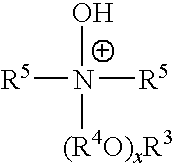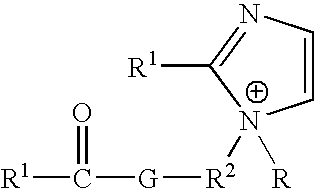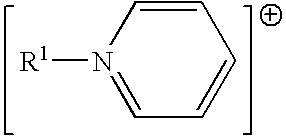Ionic liquids derived from functionalized anionic surfactants
a technology of anionic surfactants and ionic liquids, which is applied in the direction of liquid soaps, detergent compounding agents, and amphetamine/electroneutral surface active compounds, etc., can solve problems such as the damage effect of substrates
- Summary
- Abstract
- Description
- Claims
- Application Information
AI Technical Summary
Benefits of technology
Problems solved by technology
Method used
Image
Examples
example 1
Preparation of Tetraoctyl Ammonium Mid-Chain Branched Dodecylsulfate Ionic Liquid
[0086]To a solution of sodium mid-chain branched dodecylsulfate (5 g, 16.7 mmole) in 25 ml de-ionized water is added tetraoctylammonium bromide (9.1 g, 16.7 mmole) in 15 ml acetone. The mixture is stirred for 30 minutes at room temperature. After standing for 15 minutes in the reaction flask without stirring, the mixture separates into two layers by gravity. The upper organic layer is collected using a separatory funnel, and is subsequently dissolved in 25 ml methylene chloride. After standing for about 15 minutes, it separates into an aqueous layer and an organic layer The lower organic layer is collected using a separatory funnel, dried over anhydrous sodium sulfate for 5 minutes, filtered and concentrated on a rotary evaporator. The resultant oily material is stirred at 60 degrees C. and 0.1 mm Hg for 3 hours to remove last traces of solvent. This process produces a final product of about 10.2 g (abo...
example 2
Preparation of Triisooctylmethyl Ammonium Mid-Chain Branched Dodecylsulfate Ionic Liquid
[0087]To a solution of sodium mid-chain branched dodecylsulfate (5 g, 16.7 mmole) in 25 ml de-ionized water is added trioctylmethyl ammonium chloride (6.7 g, 16.7 mmole) in 15 ml acetone. The mixture is stirred for 30 minutes at room temperature. After standing for 15 minutes in the reaction flask without stirring, the mixture separates into two layers by gravity. The upper organic layer is collected using a separatory funnel, and is subsequently dissolved in 25 ml methylene chloride. After standing for about 15 minutes, it separates into an aqueous layer and an organic layer The lower organic layer is collected using a separatory funnel, dried over anhydrous sodium sulfate for 5 minutes, filtered and concentrated on a rotary evaporator. The resultant oily material is stirred at 60 degrees C. and 0.1 mm Hg for 3 hours to remove last traces of solvent. This process produces a final product of abou...
example 3
Preparation of Tetraoctyl Ammonium Dodecylbenzenesulfonate
[0088]To a solution of sodium dodecylbenzenesulfonic acid (5 g, 80% active, tech grade, 11.5 mmole) in 25 ml de-ionized water is added tetraoctylammonium bromide (6.3 g, 11.5 mmole) in 15 ml acetone. After stirring 30 minutes at room temperature, the stirring is stopped and allowed to stand 15 minutes. The solution separates into two layers by gravity. The organic upper layer is collected in a separatory funnel. It is dissolved in 25 ml methylene chloride. After standing for 15 minutes, it separates into a small aqueous layer and an organic layer. The lower organic layer is collected using a separatory funnel, dried over anhydrous sodium sulfate for 5 minutes, filtered and concentrated on a rotary evaporator. The resultant oily material is stirred at 60 degrees C. and 0.1 mm Hg 18 hours to remove last traces of solvent. 8.5 g of viscous light brown oil resulted (94.2% yield).
[0089]Other surfactant-derived ionic liquids of the...
PUM
| Property | Measurement | Unit |
|---|---|---|
| temperatures | aaaaa | aaaaa |
| melting point | aaaaa | aaaaa |
| temperature | aaaaa | aaaaa |
Abstract
Description
Claims
Application Information
 Login to View More
Login to View More - R&D
- Intellectual Property
- Life Sciences
- Materials
- Tech Scout
- Unparalleled Data Quality
- Higher Quality Content
- 60% Fewer Hallucinations
Browse by: Latest US Patents, China's latest patents, Technical Efficacy Thesaurus, Application Domain, Technology Topic, Popular Technical Reports.
© 2025 PatSnap. All rights reserved.Legal|Privacy policy|Modern Slavery Act Transparency Statement|Sitemap|About US| Contact US: help@patsnap.com



